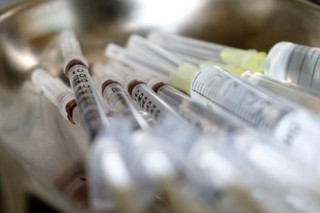Loading
Search
▼ Japan Set to Accelerate COVID-19 Vaccine Program For Elderly
- Category:Other
Japan will step up efforts to complete the vaccination of its elderly population by the end of July.
Japan has announced that it plans to speed up the inoculation of all elderly people over the coming months amid a fourth wave of COVID-19 infections. Starting this week the government has requested that 1,490 local municipalities prepare to inoculate 9 million people in two weeks.
In Japan, daily coronavirus infections topped 6,000 for the third consecutive day this week, and for the first time, 18 deaths outside a hospital were recorded in Osaka. The number of seriously ill patients in Japan has also hit a record high of 1,189 cases.
As the world’s most rapidly aging society, Japan has a mammoth task of inoculating 36 million elderly people. Concerns about protecting its vulnerable elderly population have been heightened with the spread of highly contagious COVID-19 mutations across the country. The double N501Y mutation, which is derived from the U.K. variant, accounts for over 90 percent of those in a serious condition in Japan.
The Ministry of Internal Affairs predicts that 85 percent of local municipalities will be able to finish administering COVID-19 vaccines by the end of July while 185 municipalities will complete vaccination by the end of August and the remaining 66 municipalities in September.
Japan started its vaccine program for healthcare workers on February 17 but only a quarter of medical personnel have received two doses of the Pfizer-BioNTech vaccine. Inoculations for the elderly began on April 12 and a month later only 1 percent of the elderly population, about 240,000 people, have received their first dose.
Japan’s vaccine rollout has faced a succession of setbacks. Local municipalities have been unable to keep up with the volume of elderly people eager to get the jab.
The majority of vaccine reservations are on a first-come, first-serve basis and can be made via phone or the internet but the lack of experience using the internet among the elderly has seen phone calls pouring in, causing congestion on municipal phone lines.
On Monday, a city in Osaka prefecture was forced to suspend reservations, claiming it would jeopardize health and safety, and asked
telecommunication companies to block phone calls to municipal phone lines. On Tuesday, Kono Taro, the minister in charge of vaccines, urged patience and reassured the elderly that there were no issues with the supply of vaccines.
Some municipalities have expressed doubt in achieving the government’s vaccination targets by the end of July. A survey conducted by the National Governors’ Association found that finding medical personnel and securing facilities large enough in urban areas are serious constraints.
With COVID-19 vaccines a precious commodity, recent cases of vaccine waste attracted public outrage. The Pfizer vaccine must be stored at extremely low temperatures and used within six hours after they are opened and diluted with saline.
The results of a probe found that more than 1,000 vaccines had been thrown out in February after a freezer malfunctioned. Meanwhile, the lack of a digital reservation system saw many vaccines discarded due to no-shows or sudden cancellations.
Kyoto city decided to ask local facilities planning to vaccinate elderly residents and staff members to find a substitute in advance in case of cancellations. Meanwhile, on Wednesday, a hospital in Nara, near Osaka, publicly apologized after one person over 85 was mistakenly injected with saline solution instead of the vaccine in April.
As the Tokyo Olympics loom closer, Japan’s third state of emergency in Tokyo, Osaka, Kyoto, and Hyogo, which was originally planned to end on May 11, has been extended until May 31 with the spread of as many as five highly contagious COVID-19 variants in mid-April behind the rapid acceleration.
- May 13, 2021
- Comment (0)
- Trackback(0)


